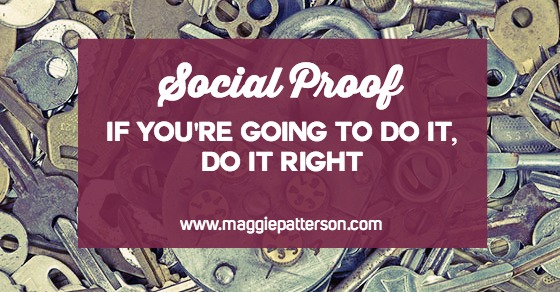
We’re all selling something. An idea. A product. A service. A dream. Rainbows and unicorns. Maple sugar lollipops.
Whatever is it you’re selling, it likely doesn’t sell itself. And neither does you just talking about how great it is, which is where social proof comes in. From testimonials to number of customers you’ve worked with to social media presence, social proof is a mighty powerful force.
Until it’s not. Until you as the seller botch it entirely and social proof becomes your biggest enemy and it slowly undoes everything you’re working so hard to do.
In the words of the Wham! song I’m Your Man “If You’re Gonna Do It, Do it Right.” While it’s a song about ahem, romantic liaisons, George Michael and Andrew Ridgeley are dishing out solid advice on social proof.
The Basic Types of Social Proof for Sellers
The type of social proof you use should largely depend on what you’re selling and your audience.
A good place to start is testimonials, because people like to be able to see that you’re legit and more importantly, a little thing called implicit egotism means they like to do things that people just like them do. So if people “just like them” buy your product or service, they’ll be able to see themselves doing it too.
Aside from testimonials, we’ve got a lot of other options for social proof including:
Media Logos – The bar or box with media logos showing you where the company or personal brand has been featured.
Subscriber Counts – How many subscribers are on someone’s email marketing list.
Social Media Proof – Boxes that show the number of followers or likes on various social media channels.
Endorsements – Celebrity endorsements that show your product or service is worth noticing.
Ratings/Reviews – For product based businesses, particularly this shows satisfaction and real user feedback.
Social Shares – For blog posts or other content how many shares you have of a specific piece of content.
Client Logos – If you work with recognizable brands you can feature their logos or in case studies.
There are so many options, which is amazing news, so you have a hope of avoiding what I consider the cardinal sin of social proof. The place where it all goes wrong and you actually do yourself a disservice – negative social proof.
[Tweet “What Wham! can teach you about social proof for your biz with @magspatterson”]
How Negative Social Proof Trashes Your Credibility
Surely, any social proof is good right? Having even a wee bit should help encourage people to trust you.
Wrong. So wrong.
The book Yes! 50 Secrets From the Science of Persuasion shares the results of countless tests of theories around persuasion. In the book, there’s a rather famous study on negative social proof where they tested three different signs in the Arizona Petrified Forest to stop people from stealing the petrified wood. The sign that included negative social proof actually increased the number of thefts by 3 times.
Crazy, right? Basically, negative social proof isn’t good for anyone.
There are countless tests that demonstrate how this plays out online but the jist of all of them is that low social proof makes people not trust you or perceive that your product/service is of low quality.
Having a good understanding of how using social proof incorrectly can mess with your ability to close the sale is a must if you’re selling anything.
Here are a few key place to audit for how you stack up with social proof:
#1 Poorly Executed Testimonials
Testimonials can go wrong in a lot of ways but the biggest one is simply not having enough of them. If you have a praise page on your website, you need to have at least 5 or more testimonials on it. Having less than that makes your visitor wonder if you’re inexperienced or frankly, not that good.
Instead of placing them on a single page, use the quotes on your site where they support a service you are trying to sell and are in context. Having no proof in this case is actually better than so/so proof that’s pointing out you don’t have a lot of testimonials.
If you have a lot of testimonials, a few things can help you amp up the social proof:
- Use quotes that are short (2-3 sentences) max and share an impactful message. People are lazy readers.
- Have the quote be specific about the value you deliver.
- Include pictures of who’s giving the quote as people trust testimonials much more if they have a picture.
- Ensure they match who your customer is. They need to see themselves, so if all you have are “big names” and you actually target mere mortals, you’re missing the mark.
#2 Social Sharing Gone Wrong
From social sharing buttons to a Facebook badge in your sidebar that shows how many page likes you have, these can be very effective ways to share that you have an audience.
But if you turn around and look at it from your site visitor – and potential buyer’s perspective – how impressive is 9 tweets on your last blog post? Or the fact that you have 372 Facebook likes?
Those types of numbers are sending the right message. It’s not saying – hey, this person is so freakin’ good you must buy from them. It does just the opposite, it’s depressing and doesn’t instill confidence.
This is a simple fix. Get rid of your social sharing plugin. Kiss your Google+, Facebook Like Boxes and all that jazz goodbye. They probably just make you feel bad anyways, so clean things up and focus on what you do have.
#3 Celebrity Endorsements
This is a touchy one, but stick with me for a second. While not entirely scientifically proven, I’m going to put this out there.
There’s no doubt a celebrity type endorsement can help you. In the online entrepreneur game, we see this all time with well-known personal brands lending their name to help someone they are connected with or has been a client. Which in and of itself, isn’t a problem in a lot of cases.
Where the problem as I see it comes from is three real places, all of which I’d recommend you proceed with caution with your celeb endorsements:
- When the person is someone who hands out endorsements constantly and you see them splashed all over the web.
- The person hasn’t ever worked with you or used your service. (Sound the BS alarm!)
- That person is not aligned with your business or approach and will actually repel your audience.
If you’re going to use celebrity type endorsements be wise to how it makes your visitors feel. Does it get them excited and make them trust you that much more? Or does it make them roll their eyes?
Watch out for negative social proof and don’t let what’s supposed to help actually hurt your business. Get smart about your social proof as a seller and make your job that much simpler.
[Tweet “Is how you’re using social proof backfiring? New blog post by @magspatterson”]

